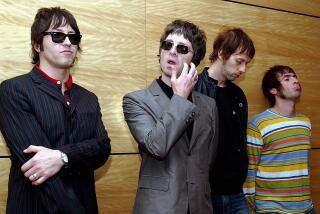Hoping a Second Chance Won’t Escape Them
- Share via
Two years ago, Blur’s battles with Oasis had become notorious. Both English groups were known as talented purveyors of a brash, Beatle-esque pop sound, but which was better? Who sold more records? Which band was the undisputed king of Brit-pop?
The answer came quickly and brutally. Blur’s “The Great Escape” album was a commercial dud, while Oasis released “(What’s the Story) Morning Glory?” and became a phenomenon. It was the kind of humiliating setback that would destroy many groups, and Blur’s future looked especially bleak in the U.S., where it never had much of a following.
But in one of this year’s biggest pop-music surprises, Blur has rebounded. Its fifth album, “Blur,” junks the Brit-pop and buzzes with experimental verve. And it’s approaching a half-million in U.S. sales; its predecessor barely cracked 100,000.
Singer Damon Albarn and company are embracing this second chance, enjoying an extensive tour that brings them to the Hollywood Palladium on Oct. 7. In an interview, Albarn talked about Blur’s resurgence, the British press and those pesky Gallagher brothers.
Question: Why do you think that “The Great Escape” was so poorly received?
Answer: We put it out when there was an expectation for British music to take over the world. The album seems almost a prototype for a musical. . . . It didn’t have what you need for a really world-dominating record. It wasn’t the ultimate Brit-pop Blur album. It’s an odd record and it came at a time when we weren’t expected to be odd, we were expected to be massive.
Q: The band was reportedly on the verge of breaking up after “The Great Escape.” Is that true?
A: The whole ambience around us back in England was just going against us, after having been ridiculously for us. It was difficult. You just feel, “Well, what are we doing this for?”
Q: You’ve had a love-hate relationship with the British press. What’s it like now?
A: At the moment they seem to like us again. It’s ridiculous--a roller coaster ride. The press now don’t like Oasis and they’re kind of making up for not liking us while they liked Oasis. If there’s a way to get at Oasis, the best way is to do it with us.
The English have a very bizarre value system built on neurotic maliciousness, and then neurotic guilt. You have to be punished for being successful. If you’re a good boy and are very modest and repentant, they’ll allow you to come back. Our conclusion when we made this record was that it didn’t matter anymore.
Q: Do you feel like you’ve finally gotten out from under Oasis’ shadow?
A: I think so, yeah. We just played in England to 100,000 people and there was this definite sense that we were back.
Q: How did you feel about going back into the studio to record “Blur”?
A: It was a big step considering how negative we felt at the end of “The Great Escape.” We had a mid-career crisis. With “Blur,” we wanted to try to create something that would heal the uncertainties. I’d discovered something new in myself, but there was a very cautious mood, sort of, “Let’s try it out and see what happens because we’ve got nothing to lose.”
Q: Did you purposely go back to your artier, punkier roots?
A: For us it wasn’t such a startling change, it was just remembering where we came from. Getting back to that was healthy. It’s easy, uncluttered. I didn’t edit myself when I was writing the songs, and that was very liberating. I’d spent a long time writing very succinct and structurally robust songs.
I think we’ve got rid of our adolescent ideas about what a band’s about and all the distractions that come with that. Sometimes I find it hard now to commit myself musically to anything just because I’m more aware of how much it counts. It all seems heavier to me now, but that’s a good thing.
*
* Blur plays with Smash Mouth on Oct. 7 at the Hollywood Palladium, 6215 Sunset Blvd., 8 p.m. $19. (213) 480-3232.
More to Read
The biggest entertainment stories
Get our big stories about Hollywood, film, television, music, arts, culture and more right in your inbox as soon as they publish.
You may occasionally receive promotional content from the Los Angeles Times.









